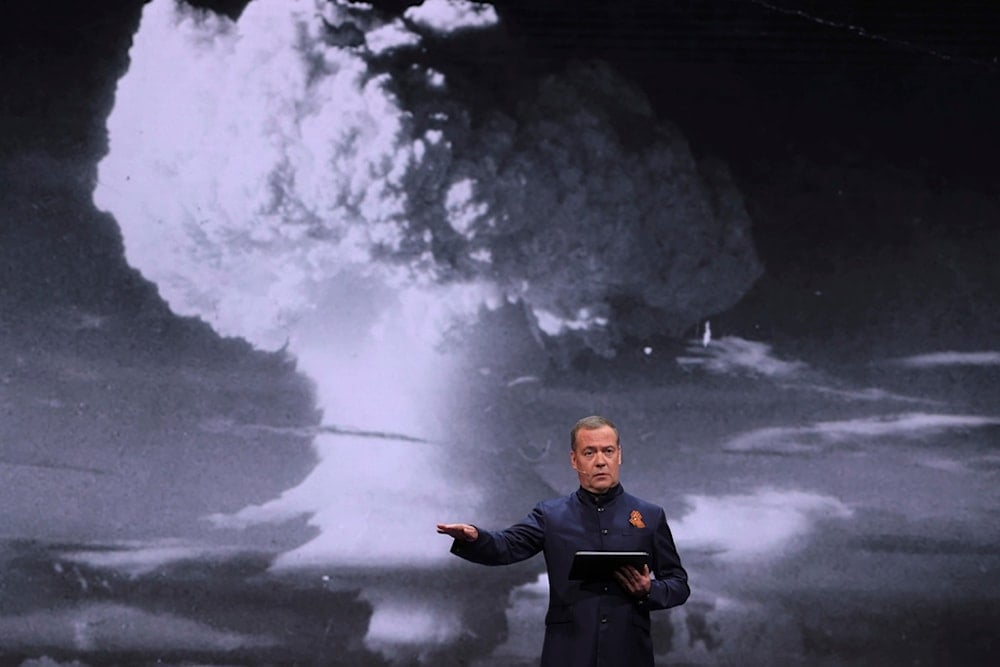Fears of World War III surge in West, Russia seen as trigger: YouGov
A new YouGov poll reveals rising fears of World War III across the US and Europe, with Russia seen as the top threat and nuclear war deemed likely by a majority of respondents.
-

Russian Security Council Deputy Chairman and the head of the United Russia party Dmitry Medvedev addresses a session titled "Our dangerous world: who is to blame and what to do?" of the Educational marathon at the Victory Museum on Poklonnaya Gora in Moscow, Russia, Tuesday, April 29, 2025, with an image of nuclear explosion on the screen in the background (Ekaterina Shtukina, Sputnik, Pool Photo via AP)
The YouGov survey, conducted in the US and five European countries, found that between 41% and 55% of respondents in Britain, France, Germany, Italy, and Spain believe a new global conflict is "very or fairly likely" within the next five to ten years. In the US, 45% share that view, as revealed by the poll on Tuesday.
The research coincides with the 80th anniversary of Victory in Europe Day and underscores growing public concern about escalating global tensions. Most respondents, between 68% and 76%, believe such a war would involve nuclear weapons, while 57% to 73% expect the death toll to surpass that of the Second World War. A notable portion, ranging from 25% to 44%, believe it would result in mass global casualties.
An overwhelming majority said their country would be drawn into a third world war, with figures ranging from 66% in Italy to 89% in the UK. However, far fewer expressed confidence in their national militaries. Only 16% of Italians and 44% of French citizens believed their armed forces could defend them. In contrast, 71% of Americans expressed confidence in the US military.
Russia was cited as the primary source of potential global conflict by 72% to 82% of European respondents, and by 69% of Americans. Islamic terrorism was seen as the next most likely cause. Interestingly, many Europeans also perceived the United States as a threat to peace in Europe, with 58% of Spaniards, 55% of Germans, and 53% of French respondents identifying tensions with the US as a major or moderate concern.
Memory divide
The poll also touched on historical awareness. Respondents in France (72%), Germany (70%), and the UK (66%) reported knowing “a great deal or a fair amount” about the Second World War. In Spain, where the country remained neutral during the conflict, only 40% said the same.
French citizens were most likely to report having learned extensively about the war at school (77%), followed by Germans (60%), Britons (48%), and Spaniards (34%). Nonetheless, large majorities, between 82% and 90%, across all countries agreed that WWII should be taught in schools and remains relevant today.
Between 31% of Spaniards and 52% of Americans said they believed “crimes like those committed by the Nazi regime in Germany in the 1930s and 40s” could happen in their own country during their lifetimes. An even larger group, ranging from 44% to 60%, said such crimes could happen in the US or another Western European country.
When asked who had contributed most to the defeat of Nazi Germany, 40% to 52% in five of the countries named the US, while 17% to 28% credited the Soviet Union. In Britain, 41% said their own country played the leading role, a view held by just 5% to 11% of other respondents.
Read more: Victory Day in Russia: Commemorating the past amid present tensions
Germans were split on their country's postwar reckoning. Nearly half (46%) believed Germany had done a good job confronting its past, a sentiment echoed by 49% of Americans and 58% of Britons. However, 47% of Germans also felt their nation had become “overly conscious of its Nazi past,” limiting its ability to address contemporary challenges. Only 24% believed the country had struck the right balance.
Finally, views on peacekeeping institutions were largely positive. Between 52% and 66% across the six countries credited NATO as playing the most significant role in maintaining peace since 1945. A plurality (44% to 60%) also recognized the UN’s contributions, and 45% to 56% said the EU had helped prevent major conflict in Europe.

 4 Min Read
4 Min Read








